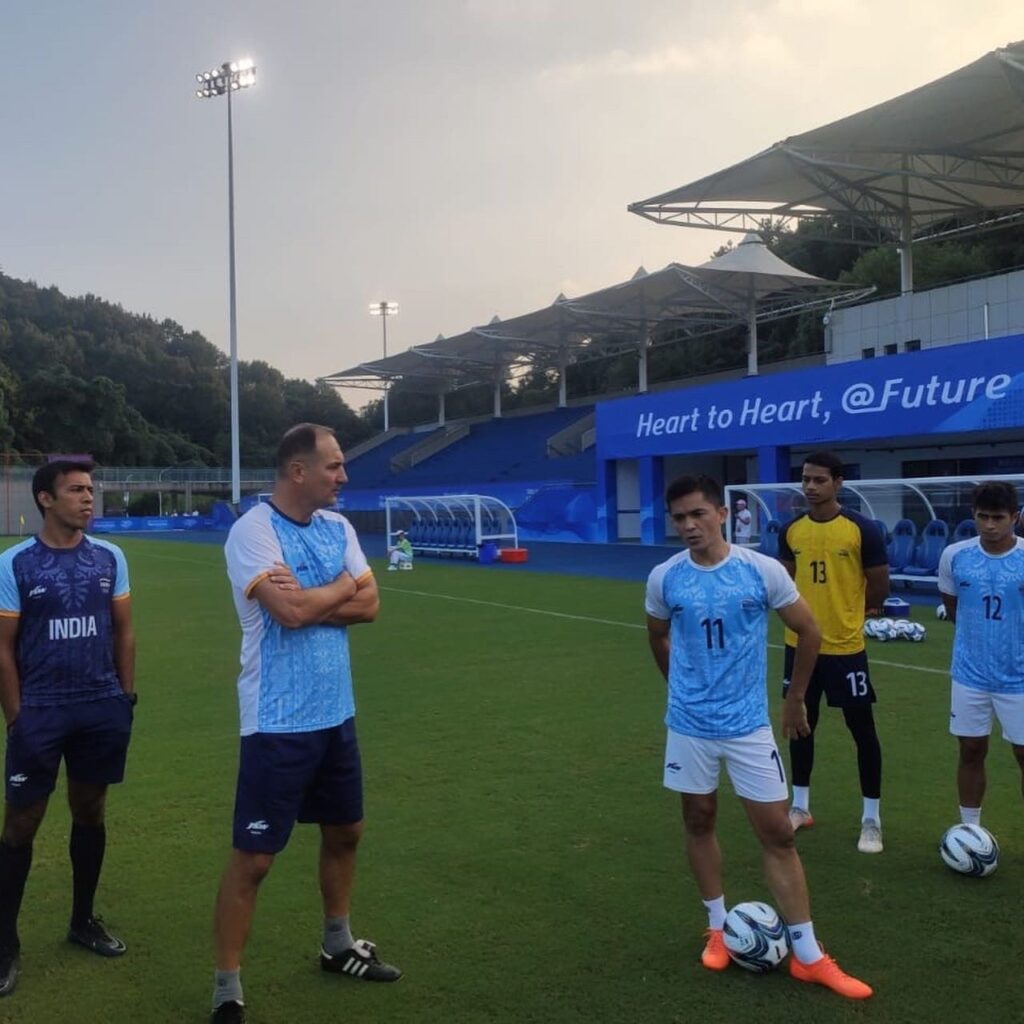
In the end, the gulf in quality was all too apparent. Saudi Arabia are Asian Under-23 champions for a reason, and even with two seasoned pros in Sunil Chhetri and Sandesh Jhingan in the ranks, India were no match for them in a round-of-16 clash at the Asian Games. Two superbly taken goals from Mohammed Khalil Maran, who will soon return to training with Cristiano Ronaldo at Al-Nassr, were the difference, but the score line didn’t tell the whole story.
“If we speak about the fight, I’m very proud of them,” Igor Stimac, the India coach, told RevSportz when asked about his wards’ efforts. “I told them before the game that if we fight well, then we might come to a draw at the end of the game. But to win games like these, there needs to be certain quality which was not there today. We need to be honest and congratulate the Saudi Arabia team. They’re a quality side and deserved to win. Even with the huge difference, we were lucky to finish the game 2-0.”
India defended heroically in the first half, with Jhingan putting his body on the line multiple times. But with Saudi hogging possession and fatigue creeping in, errors were almost inevitable. “I feel sorry because most of their chances came from our silly mistakes,” said Stimac. “Silly mistakes in passing, which is again a point about basic technique and skills, which were missed in the development of these players.
“India needs to start thinking about these development programmes, about grassroots, about everything so that the future might be bright. On the other hand, I appreciate all the boys who were with us for this tournament. It was not easy to get them released from the clubs. I give big thanks to everyone who was helping us to come over here, to witness such experience. It’ll be good if they learn something from this tournament.”
The coach minced no words when asked about the lessons he would take back from China. “Big lesson from this tournament is don’t send us anywhere if we don’t get our best players to represent our country,” he said. “Also, do not us send anywhere if you cannot provide time for us to work and prepare well. We were here exposed representing India. We took it well on our shoulders. I think the supporters can be proud of these boys who came here unprepared, without playing or having one training session. Today, we played against a team which has been together for four years. They started working as a unit, and you can see what kind of difference it can make. If we can do the same, then there’s no need for us to be afraid for our future.”
The sub-par preparation, which involved the team – or rather 17 members – reaching Hangzhou less than 20 hours before kick-off against the hosts was also part of Chhetri’s focus as he looked back on the campaign. “It wasn’t easy at all,” he told RevSportz. “The first team meeting was on the flight here: we had never played together. Sandesh and I had never played with these boys. We had a game the next day. When you think of all that, you know how hard it was. I can tell you it was not easy and the youngsters should all be proud. They all punched above their weight.”
India’s next assignment, with the full squad, rather than primarily the Under-23s, is a Merdeka Tournament clash with Malaysia in Kuala Lumpur on October 13. “I just hope whoever is selected for the game on 13th is fit and puts his hand up,” said Chhetri. “We are a formidable unit now at home. We need to get better away and that’s what the aim is.”
Even as Chhetri was left to feed off scraps against a dominant Saudi side, Jhingan was India’s defensive rock, leading by example. “They were a better side,” he told RevSportz after the game. “In our hearts, we know a defeat can’t just go away. But the boss spoke to us all before and after the game – it was a great speech.
“Of course we are disappointed. But credit to them. They are a superb team. When we look back, the way we assembled, the travel and all of it, there is a lot to be proud of. We take our lessons and try and get better.”
The million-dollar question for Indian football now centres around Stimac, and the new contract offer that has been made by the All Indian Football Federation (AIFF). Stimac isn’t the sort of person to be satisfied with a pay hike. What he wants is to bring about root-and-branch change that will establish India as one of Asia’s top-12 football nations. The blueprint he has offered the federation deals extensively with plans for the age-group teams.
“That’s a huge question to a different address, not to me,” said Stimac cryptically before he left the venue. Much as he wants to take India to the Asian Cup and possibly qualify from a very tough World Cup qualifying group that also includes Qatar and Kuwait, he’s unlikely to want to continue in a system that isn’t geared towards any sort of excellence – where passing the buck, rather than passing the ball accurately, seems to be priority.
“I hope it [the contract situation] is resolved soon so that we can focus on the matches ahead and start preparing,” said Jhingan. But unless the ISL clubs and the AIFF are on board with Stimac’s vision statement, Indian football could again be looking at the sort of long, cold winter it’s become accustomed to.
RevSportz Editorial
You don’t need to be any ex-international or football pundit to know that India sent a hopelessly imbalanced side to the Asian Games. There were hardly any midfielders in the squad, and the engine room of the side was the least manned. The clubs will say that the squad was announced too late for them to release players without seriously impact their league fortunes, while the AIFF can hide behind the excuse that they don’t run the ISL.
But here’s the thing. The Saudi squad, including Maran, the scorer of both goals against India, has eight players (out of 22) from the country’s big four clubs – Al-Ittihad, Al-Nassr, Al-Hilal and Al-Ahli. The Saudi season is also in full swing, with seven rounds of matches having been completed. Those clubs could also have clung on to their players, and asked the federation to send a third-string squad to China.
But the Saudi authorities recognised that these are some of the future stars of the national side, and they would only benefit from playing against the best in their age group. Sitting on the bench, no matter how high-profile the league, and coming on for a few minutes each week is no substitute for half a dozen games in tournament play. Hopefully, the AIFF will learn from this. Instead of papering over the shocking preparation by pointing to how well the boys fought, they need to do much more in their role as the bridge between the clubs and the national team. The plucky-losers label has no value beyond a point.




